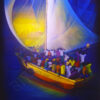Full fathom five thy father lies;
Of his bones are coral made;
Those are pearls that were his eyes;
Nothing of him that doth fade,
But doth suffer a sea-change
Into something rich and strange.
Sea-nymphs hourly ring his knell:
Ding-dong.
Hark! now I hear them — Ding-dong, bell. William Shakespeare
So the other disciples told him, “We have seen the Lord.” But he said to them, “Unless I see the mark of the nails in his hands, and put my finger in the mark of the nails and my hand in his side, I will not believe.” John 20:25
- Be never afraid of doubt.
- Be afraid of all sophistries, and tricks, and strifes.
- Getting into a scornful way is fatal.
- Never put force on the mind to make it believe.
- Never be in a hurry to believe.
Dissolving of Doubt – The Rev. Horace Bushnell
To convince someone of the truth, it is not enough to state it, but rather one must find the path from error to truth.
I must plunge into the water of doubt again and again.
Remarks on Frazer’s Golden Bough – Ludwig Wittgenstein
 Lent is over. Easter, Alleluia, is here.
Lent is over. Easter, Alleluia, is here.
Except for Thomas. He didn’t get the memo. He went out for bread and milk and everything changed. At least that’s what his now “Jesus freak” friends were telling him. We know the story. Those names we get as kids can stick with us. Ask the kid who went through school as “stinky” or “droopy drawers”. Those names stick and they can hurt. Ask “doubting Thomas”?
Thomas was a Missouri kind of guy. Missouri’s U.S. Congressman Willard Duncan Vandiver is said to have coined the phrase in 1899. During a speech in Philadelphia, he said:
“I come from a state that raises corn and cotton and cockleburs and Democrats, and frothy eloquence neither convinces nor satisfies me. I am from Missouri. You have got to show me.”
Show me!
Doubt has fallen on hard times. We have plenty of non-believers, atheists, true believers and fundamentalists. But not so much doubters. It’s not popular. It’s the agnostic problem. The agnostic is subject to the same sort of prejudice as the bisexual. “Oh yeah, sure, but really deep down you know what you want.” Or “You just don’t have the courage to be gay!” So it goes with the agnostic.
I’m not agnostic. I believe in God, and Jesus as his unique messenger, in the context of the language that shapes the intersubjectivity that makes that “I believe” statement meaningful. But this is a most precarious perch. The emphatic shouts of the Easter Christian can jar my native simile and send me reeling into the cloud of unknowing. Lent is the quintessential period of lowered expectation. For some it ends with being in the place of show me.
The language of belief is discovered by plunging again and again into the water of doubt. There should be something unsettling in baptism. The water should run up your nose and make you gasp and choke. Think waterboarding. To believe in God is turn our lives over to a form of interrogation, an interior process that can be both terrifying and can be ecstatic. Think Hebrews 10:31: “It is a dreadful thing to fall into the hands of the living God.”
To doubt is to not be in a hurry even when you think you are drowning.
If the water is too deep then dive deeper.
My Lord and my God…
Show me!
This is my story, this is my song,
Praising my Savior all the day long;
Rev. Fred 4/15/2015





